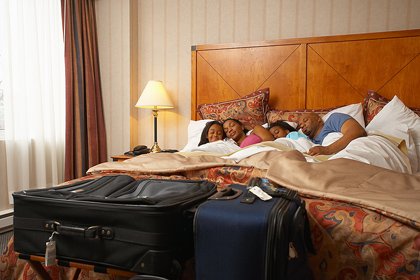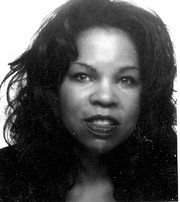This week’s column reminds me of those grade school writing assignments that asked me to compose an essay on how I spent summer vacation. As I prepared to write this week’s column, I’m torn between fleshing out from scratch a traditional education article and sharing an intriguing academic concept I discovered between the pages of a very old book.
Jayne Matthews Hopson
By the third day of my blended family’s first extended vacation I was nearly ready to panic. The mechanics of getting two teen-aged girls, a husband, a 21-year-old son and myself packed up and ready to travel began to take its toll even before the plane landed in Los Angeles.
After a careful search, I had to accept the fact that the research notes for this week’s column were not inside my carryon bag. This vacation was supposed to be work-free. With my notes I could have finished the article on the flight to California. No notes, no story. However, I wasn’t going to let that spoil my whole trip. I would squeeze out some time to write once I got settled in.
Upon our arrival, we stopped twice to see three sets of relatives before getting into our beds, exhausted. The next morning everyone weighed in on how to best spend the next two weeks. My son wanted to go to Santa Monica for a “new” vintage camera and some old LP’s. The girls wanted to go shopping, first to Rodeo Drive, then to the fashion district and the mall.
My husband, a big baseball fan, planned to see three California teams play, an Angels game, a Dodgers game and a day trip by train to San Diego to watch the Padres battle it out with the Orioles. My perfect vacation day would be hours at the beach doing absolutely nothing other than reading and sipping a cool beverage.
Coordination of these activities proved to be a matter of managing expectations and resources. One rental car shared by five people wanting to go five different places is essentially a test of everyone’s capacity for compromise. I prayed for the wisdom to make good, fair choices for my family. With my deadline fast approaching I also asked for some divine intervention to bless me with a meaningful, thought-provoking idea for this week’s column.
While coordinating and implementing everyone’s vacation wishes remains a work in progress, the inspiration for the column came in a tiny, very old volume of prose titled “Sesame and Lilies” by John Ruskin. Purchased in a second-hand bookstore by my youngest daughter “Sesame and Lilies” was published in 1865. It was at the time considered “a classic nineteenth-century statement on the natures and duties of men and women.”
In its 2002 reprint, Yale University Press describes Ruskins’s ideas and concerns as “widely recognized as having anticipated [today’s] interest in environmentalism and sustainability.” A careful consideration of Ruskin’s words compels the contemporary reader to think more deeply about what we want our schools to do and why. Here is a brief passage that speaks directly to our society’s concept of a good education:
It happens that I have practically some connection with schools for different classes of youth; and I receive many letters from parents respecting the education of their children. In the mass of these letters I am always struck by the precedence, which the idea of a “position in life” takes above all other thoughts in the parents’—more especially in the mothers’—minds.
“The education befitting such and such a station in life”—this is the phrase, this the object, always. They never seek, as far as I can make out, an education good in itself; even the conception of abstract rightness in training rarely seems reached by the writers.
But an education “which shall keep a good coat on my son’s back; —which shall enable him to ring with confidence the visitors’ bell at double-belled doors; which shall result ultimately in establishment of a double-belled door to his own house; —in a word, which shall lead to ‘advancement in life’; —this we pray for on bended knees —and this is all we pray for.”
It never seems to occur to the parents that there may be an education, which, in itself, is advancement in life; — that any other than that may perhaps be advancement in Death; and that this essential education might be more easily got, or given, than they fancy, if they set about it in the right way; while it is for no price, and by no favor, to be got, if they set about it in the wrong.
Jayne Matthews Hopson writes weekly on education matters because “only the educated are free.”

